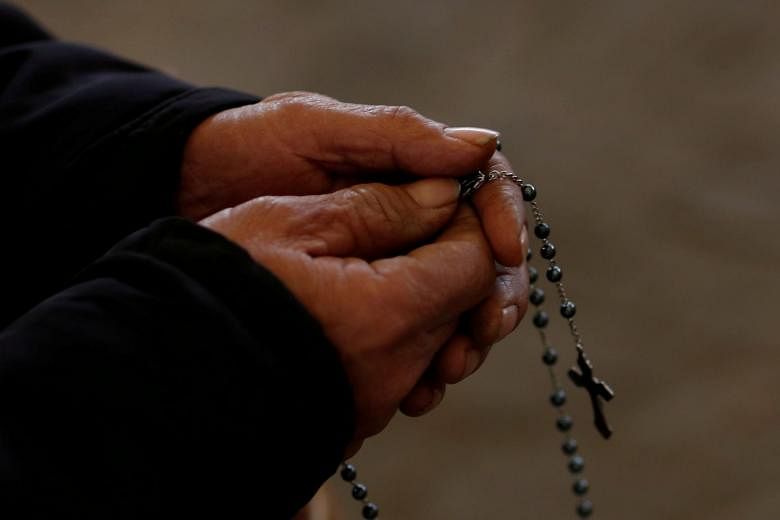VATICAN CITY (REUTERS, WASHINGTON POST) - A framework accord between the Vatican and China on the appointment of bishops is ready and could be signed in a few months in what would be a historic breakthrough in relations, a senior Vatican source said.
Even a partial resolution of the thorny issue of who gets to appoint bishops could open the way for a resumption of diplomatic relations nearly 70 years after they were cut during the Communist takeover of China.
Full relations would give the Church a legal framework to look after all of China's estimated 12 million Catholics and move on to focus on Catholic growth in a country where Protestant churches are already growing fast.
Catholics in China are split between those in "underground"communities that recognise the pope and those belonging to a state-controlled Catholic Patriotic Association where bishops are appointed by the government in collaboration with local church communities.
Under the formal deal, the Vatican will have a say in negotiations for the appointment of future bishops, the source told Reuters, declining to give details.
"It is not a great agreement but we don't know what the situation will be like in 10 or 20 years. It could even be worse," the source said on Thursday.
"Afterwards, we will still be like a bird in a cage, but the cage will be bigger," he said. "It is not easy. Suffering will continue. We will have to fight for every centimetre to increase the size of the cage," he added.
The source rejected recent accusations by a senior cardinal that the Vatican was prepared to "sell out" the church in China and media suggestions that Pope Francis was out of the loop on China negotiations.
He said the pope followed the China dossier very closely and had backed an offer made to two Chinese bishops loyal to the Vatican in which they would take on different positions in their dioceses in order to facilitate an overall accord with government-backed bishops.
Five out of seven very complex situations regarding "illegitimate bishops", those with government backing, had been resolved. They have asked for a pardon from Pope Francis and to be made legitimate in the eyes of the Church.
The Chinese Foreign Ministry said in a statement provided to Reuters on Friday (Feb 2) that China had always been sincere in its efforts to improve China-Vatican relations.
"We are willing to, in accordance with relevant principles, continue to engage in constructive dialogue with the Vatican side and push forward the improvement of bilateral ties."
Last December, with papal backing, a Vatican delegation went to China to make an offer relating to two Vatican-recognised bishops.
One, an 87-year-old prelate, would retire to make way for a state-backed bishop to succeed him. Under the scenario, the government would officially recognise the Vatican-backed prelate as "bishop emeritus".
Another Vatican-recognised bishop would become an auxiliary, or assistant, to one who had been appointed by the government. Though he would effectively take on a lesser role, the government would grant him official recognition as part of the deal.
The source said both Vatican-backed prelates recognised they would be making sacrifices for the greater good of the Church.
There currently was what the source called "a gentleman's agreement" on seven government-backed bishops who would be made legitimate after seeking a papal pardon, but this still had to be formalised.
Dossiers have to be prepared for the pope in order to make the case for legitimising them.
This week, Cardinal Joseph Zen, 86, the outspoken former bishop of Hong Kong, caused a stir with a Facebook post highly critical of the Vatican's recent overtures to China.
Cardinal Zen wrote: "So, do I think that the Vatican is selling out the Catholic Church in China? Yes, definitely, if they go in the direction which is obvious from all they are doing in recent years and months."
In a sharply worded statement following the post, the Vatican said it was surprising and regrettable that some people in the Church were "fostering confusion and controversy".
Cardinal Zen, who has often criticised the Vatican's attempt at rapprochement with Beijing, suggested that Vatican diplomats doing the groundwork were keeping the pontiff in the dark or even going against his wishes.
Five Taiwanese politicians have announced plans to travel to Europe and seek an audience with the pope to express their concerns, Taiwanese media reported. Anna Kao, head of the Department of European Affairs at Taiwan's Ministry of Foreign Affairs, said that her government was aware of the dialogue, but also pointed out that even if there was a deal over the appointment of bishops, there remain huge differences between the Vatican and Beijing over religious freedom, according to local media.
Taiwan's ambassador to the Holy See, Matthew S.M. Lee, said the Vatican was engaging with China to ease the suffering of those attending underground churches in mainland China, and said dialogue was in line with God's will, according to a news report reposted by his embassy.
The Vatican statement said there was no "difference of thought and action" between the pope and his aides and the source said the pope had been fully briefed before the delegation left for Beijing in December and after it returned.
In China, a priest at St. Joseph's Cathedral, the largest in the city of Tianjin and part of the state system, said believers would "of course" welcome the deal.
"It is good for the country, the people and believers," the priest, who only gave his name as Zhang, said, saying it would give them an "international partner" and remove obstacles to the practice of their religion.
The Catholic Church may also feel under pressure from the rapid growth of Protestant Churches in China, experts said.

